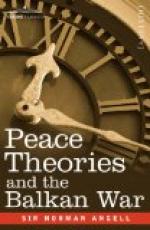people in Germany are very grateful for the advice
which Mr. Churchill and Lord Roberts thus give
to the nations of the world, and we may expect to see
German armaments so increased as to accord with
the new principle.
And Lord Roberts is courageous enough to abide by the conclusion which flows from the fundamental assumption of Liberals and Conservatives alike, i.e., that trade and the means of livelihood can be transferred by force. We have transferred it in the past. “It is excellent policy; it is, or should be, the policy of every nation prepared to play a great part in history.” Such are Lord Roberts’ actual words. At least, they don’t burke the issue.
The Germans will doubtless note the combination: be so strong as to make victory certain, and strike when you have made it certain, and they will then, in the light of this advice, be able to put the right interpretation upon our endeavours to create a great conscript force and our arrangements, which have been going on for some years, to throw an expeditionary force on to the continent.
The outlook is not very pleasant, is it? And yet if you accept the “axiom” that our Empire and our trade is dependent upon force and can be advantageously attacked by a stronger power there is no escape from the inevitable struggle—for the other “axiom” that safety can be secured merely by being enormously stronger than your rival is, as soon as it is tested by applying it to the two parties to the conflict—and, of course, one has as much right to apply it as the other—seen to be simply dangerous and muddle-headed rubbish. Include the two parties in your “axiom” (as you must) and it becomes impossible of application.
Now the whole problem sifts finally down to this one question: Is the assumption made by Lord Roberts and implied by Mr. Churchill concerning the relation of military force to trade and national life well founded? If it is, conflict is inevitable. It is no good crying “panic.” If there is this enormous temptation pushing to our national ruin, we ought to be in a panic. And if it is not true? Even in that case conflict will equally be inevitable unless we realise its falseness, for a universal false opinion concerning a fact will have the same result in conduct as though the false belief were true.
And my point is that those concerned to prevent this conflict seem but mildly interested in examining the foundations of the false beliefs that make conflict inevitable. Part of the reluctance to study the subject seems to arise from the fear that if we deny the nonsensical idea that the British Empire would instantaneously fall to pieces were the Germans to dominate the North Sea for 24 hours we should weaken the impulse to defence. That is probably an utterly false idea, but suppose it is true, is the risk of less ardour in defence as great as the risk which comes of having a nation of Roberts and Churchills on both sides of the frontier?
If that happens war becomes not a risk but a certainty.




